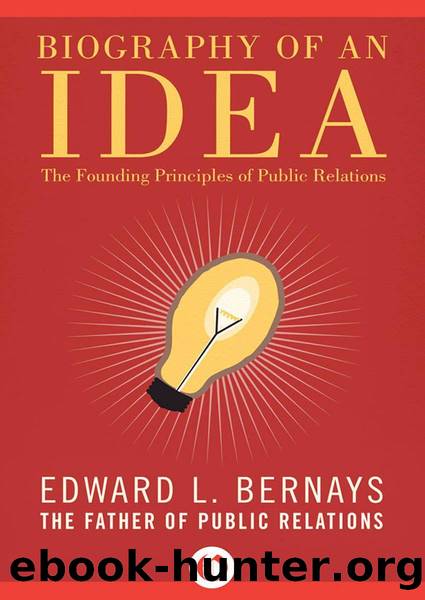Biography of an Idea: The Founding Principles of Public Relations by Edward L. Bernays

Author:Edward L. Bernays [Bernays, Edward L.]
Language: eng
Format: epub
Tags: Autobiography, Biography, Business, Business Writing, Economics, Finance, Public Relations
ISBN: 9781497698673
Google: tFO2BgAAQBAJ
Amazon: B00TQEM19E
Publisher: Open Road Media
Published: 2015-04-06T23:00:00+00:00
chapter 32
BROADCASTING: CBS AND NBC
I would have questioned anybody’s judgment if they had told me in 1929 that William S. Paley, the young 27-year-old man who asked for my public relations counsel for a plaything his father had bought him, would in thirty years be head of a huge economic empire, the Columbia Broadcasting Company.
Paley looked even younger than he was. He was affable, cool, suave, polite, soft-spoken and well groomed. He told me he was graduated from the University of Pennsylvania with a B.S. degree in economics and had become vice-president and secretary of the Congress Cigar Company, which manufactured Palina cigars (named after the family) in Philadelphia.
Our Philadelphia friends at the summer place we rented on the Jersey coast at Elberon described Paley as something of a playboy, a bachelor-about-town with social ambitions and not too heavy on the intellectual side. His snobbish contemporaries in the circle of Philadelphia Jews he wanted to move in snubbed him because his father came from Russia and made cigars, while their fathers were of German background, bankers, stock-exchange brokers, department-store owners or lawyers. I think Paley longed to show them that he could and would make good in New York, not in Philadelphia.
His father co-operated by trying to find a business for his son that would satisfy his ambition for a more exciting and agreeable pursuit than cigar-making. An ex-Army man, Major White, was then attempting to build a radio network to compete with the already entrenched National Broadcasting Company, with its red and black networks, owned by RCA. But White had neither the money nor the drive to put over this formidable undertaking. Paley Sr. bought White out.
In July 1928 young Paley came to the company, and on January 3, 1929, a few months before his visit to me, he became president.
Radio broadcasting had a powerful fascination for a young man with ambition in 1928. Miraculously, sound came out of a box. Without wires it seemed miraculous. Radio no longer is an epoch-making new concept, but then radio was astounding, a scientific wonder. It made a more profound impression on me than the first motion pictures. I had had preparation for them, for as a boy at home I played with a primitive motion-picture machine made up of pictures in a revolving cylinder. But nothing like it preceded radio.
Paley was intrigued by this new instrument, still unproven as to its effectiveness as a social, educational, political or economic force. He told me about the company, its twenty employees and its local station in 1928. By 1929 Columbia could broadcast from any point in the United States and from almost any point in Canada, Mexico, Cuba and the West Indies.
Growth corporations are the hopes of the speculative American investor today. He buys the stock of these companies, hoping they will grow faster than the economy. But the most imaginative seeker after growth would have hesitated prophesying the spectacular strides of Columbia Broadcasting from 1929 to today.
Last year CBS earned $49,655,739, mainly in television.
Download
This site does not store any files on its server. We only index and link to content provided by other sites. Please contact the content providers to delete copyright contents if any and email us, we'll remove relevant links or contents immediately.
Hit Refresh by Satya Nadella(8338)
When Breath Becomes Air by Paul Kalanithi(7264)
The Girl Without a Voice by Casey Watson(7263)
Do No Harm Stories of Life, Death and Brain Surgery by Henry Marsh(6337)
A Court of Wings and Ruin by Sarah J. Maas(6076)
Hunger by Roxane Gay(4219)
Shoe Dog by Phil Knight(4169)
Everything Happens for a Reason by Kate Bowler(4067)
A Higher Loyalty: Truth, Lies, and Leadership by James Comey(4033)
The Rules Do Not Apply by Ariel Levy(3906)
Tuesdays with Morrie by Mitch Albom(3832)
The Immortal Life of Henrietta Lacks by Rebecca Skloot(3826)
How to Change Your Mind by Michael Pollan(3679)
Millionaire: The Philanderer, Gambler, and Duelist Who Invented Modern Finance by Janet Gleeson(3569)
All Creatures Great and Small by James Herriot(3517)
Elon Musk by Ashlee Vance(3455)
Tokyo Vice: An American Reporter on the Police Beat in Japan by Jake Adelstein(3440)
Man and His Symbols by Carl Gustav Jung(3315)
The Money Culture by Michael Lewis(3284)
